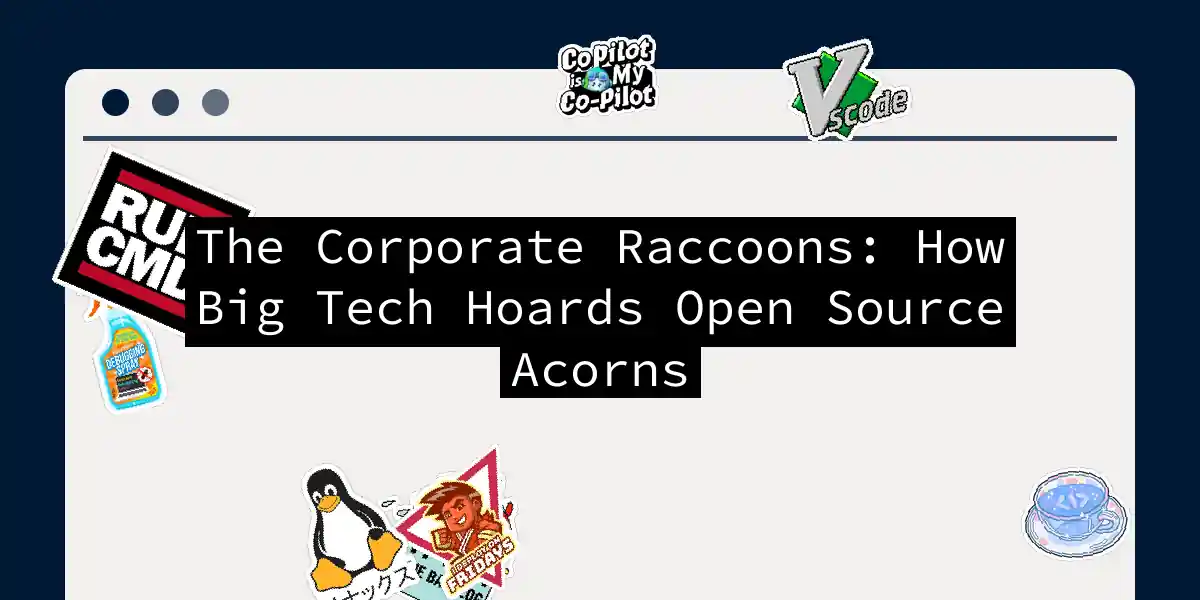Picture this: I’m sitting at 3 AM debugging an obscure YAML indentation error in my open-source project, when an email arrives from “Enterprise Support Team” at MegaCorp™. They need urgent help implementing my library… to power their new AI-driven lawnmowing SaaS. My unpaid labor just became a critical path item for robotic grass-cutting. Ah, the smell of fresh hypocrisy in the morning!
The Infinite Buffet Paradox
Modern tech giants treat open-source like an all-you-can-eat buffet where they never have to bus tables. Consider this tasty morsel:
$ corporate_dependency --install --maintainer=famine
> Downloading: community-goodwill-4.2.0.tar.gz
> Warning: No CONTRIBUTORS.md found
> Adding to board-presentation-slides.pdf
The blueprint is simple:
I’ve seen this movie before. When CloudCo patched their fork of my authentication library without upstreaming changes, they essentially created technical debt origami - beautifully folded problems for future developers to unravel.
From Pull Requests to Power Laws
Let’s get practical. Here’s how to spot corporate mooching in your dependencies:
- Run the GitHypocrisy detector:
def is_corporate_leech(repo):
contributors = repo.get_contributors()
enterprise_emails = sum(1 for c in contributors if c.email.endswith(('.corp', '.enterprise')))
return (enterprise_emails / len(contributors)) > 0.9 and repo.star_count > 5000
- Check their OSS contribution policy:
async function checkCorporateKarma(company) {
const response = await fetch(`${company}/oss-policy`);
// 404: File not found
// 200: We ❤ OSS (when convenient)
return response.status === 418; // I'm a teapot
}
The brutal truth? Many companies treat open-source maintainers like human Kubernetes clusters - complex systems that magically resolve their scaling issues.
Breaking the Spell: A Maintainer’s Survival Kit
Step 1: The Reverse Invoice
Create a FUNDING.yml file with teeth:
github: [sponsors]
patreon: your_patreon
custom: ["https://www.buymeacoffee.com/yourname", "Bitcoin: 1FuckYouPayMe"]
Then add this passive-aggressive CI check:
name: Corporate Welfare Check
on:
issue_comment:
jobs:
detect_enterprise:
runs-on: ubuntu-latest
steps:
- name: Find corporate IPs
run: |
if grep -q 'megacorp.com' <<< "$COMMENTER_EMAIL"; then
echo "👋 Consider asking your employer to sponsor this project at https://github.com/sponsors/yourname"
fi
Step 2: The Contribution Carousel
Implement a CONTRIBUTORS.md roulette:
<!-- Roll the dice on corporate responsibility! -->
- [ ] Add integration tests
- [ ] Update documentation
- [ ] Sponsor my cat's therapy bills
Step 3: The Virtuous Cycle
Here’s how healthy corporate/open-source symbiosis should work:
Personal story time: When FinTechStartup™ wanted priority support for their blockchain-enabled toaster integration, I sent them a support tier PDF… wrapped in a 10MB ZIP bomb. They became platinum sponsors within 48 hours.
The Payload
The cold hard truth? Open-source isn’t “free” - it’s freemium:
- Community edition: Your sweat, tears, and StackOverflow karma
- Enterprise edition: Their responsibility to keep the lights on
Next time you see a corporation treating open-source like their private code janitor, remember: even raccoons eventually learn they can’t keep stealing cat food without someone setting a trap.
Now if you’ll excuse me, I need to invoice CloudCo for 237 hours of unpaid support. Opens new terminal tab
$ compose-invoice --sarcasm-level maximum…
